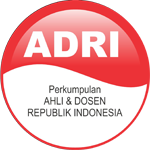Students Engagement in Utilizing Technology For Learning Support
Abstract
ABSTRACT: The research is aiming at exploring the utilization of technology at both Faculty of Teacher Training and Education, Sriwijaya University and Faculty of Arts and Education within Deakin Universit.The data was collected through the interview with the lecturers and also the field observation. On this faculty, the BI learning program is organized in two modes: on campus and off campus. Based on the observation and interview, it could be identified that 1) Learning activity: Mode off campus 2) Classroom Management is conducted individually or in group and a virtual meeting with the instructor and or via video conference 3) Devices utilized by the students were hardware and software with certain specification, 4) Application/software utilized was adopted package software, 5) Learning material was developed by the instructors, 6) Supported crew was the IT staff, and 7) Instructur in the learning activity was still required with different role as the learning material developer.
Keywords: engagement; technology; learning support
Full Text:
PDFReferences
Agusta, Okky Z. (2018).Developing Android Reader Response Strategy Based Reading Material in Relation to Character Building. Unpublished Thesis submitted at Postgraduate School Sriwijaya University, South Sumatera, Indonesia.
Calvert, J. (2001). Deakin University: Going Online At A Dual Mode University. International Review of Research in Open and Distance Learning, 1(2). Retrieved from http://www.irrodl.org/index.php/irrodl/article/download/20/52
Ciptaningrum, D.S. (2017). The development of the Survey of Technology Use, Teaching, and Teachnology-Related Learning Experiences among Pre-Service English Language Teachers in Indonesia.Journal of Foreign Language Teaching and Learning, 2(2), 11-26.
Clement G, S. (2017). Digital Learning: Education and skills in the digital age. Santa Monica, St. George's House, Corsham Institute & RAND Europe.
Deakin University.(1990). Deakin University Handbook. Retrieved from https://deakin-governance.deakin.edu.au/CR/Handbooks.nsf/0/2C1913095F4649E1CA257D2B0081D4BD/$File/deakin-university-1990-handbook.pdf .
Egan, K. (2003). What is Curriculum? Journal of the Canadian Association for Curriculum Studies, 1(1). Retrieved from: https://jcacs.journals.yorku.ca/index.php/jcacs/article/viewFile/16845/15651
Ghavifekr, S., Athirah, W., &Rosdy, W. (2015).Teaching and learning with technology: Effectiveness of ICT integration in schools. International Journal of Research in Education and Science (IJRES), 1(2), 175-191.
Higgins, S., Xiao, Z., &Katsipataki, M.(2012). TheiImpact of digital Technology on Learning: A Summary for the Education Endowment Foundation. A Report of School of Education, Durham University
Inderawati, R. (2011). From classroom to peer comment in Facebook: Bridging to establish learners literacy. The International Conference of ICT for Language Learning, Florence, Italy.Retrieved from http://www. pixelonline.net/ICT4LL2011/common/download/ Paper_pdf/IBL41-282-FP-Rudy-ICT4LL2011. Pdf
Inderawati, R. (2017). The dynamics of EFL teaching in Indonesia: Be innovative teachers through social media. English Language Teaching and Research, 1(1), 29-37.
Johnson, R. B., Onwuegbuzie, A.J., & Turner, L.A. (2007).Toward a definition of mixed methods research.Journal of Mixed Methods Research, 1, 112133.
KementrianPendidikanNasional.(2007a). PeraturanMenteriPendidikanNasionalRepublik Indonesia Nomor 16 Tahun 2007 tentangStandarKualifikasiAkademikdanKompetensi Guru. Jakarta.
KementrianPendidikanNasional. (2007b). PeraturanMenteriPendidikanNasionalRepublikIndonesiaNomor 41 Tahun 2007 tentang Standard Proses UntukSatuanPendidikanDasardanMenengah. Jakarta.
KementrianPendidikanNasional.(2009). PeraturanMenteriPendidikanNasionalRepublik Indonesia Nomor 78 Tahun 2009 tentangPenyelenggaraanSekolahBertarafInternasionalPadaJenjangPendidikanDasardanMenengah. Jakarta
Mishra, P., & Koehler, M. J. (2006). Technological pedagogical content knowledge: A framework for teacher knowledge. Teachers College Record, 108(6), 10171054.
Stosic, L. (2015). The importance of educational technology in teaching. International Journal of Cognitive Research in Science (3), 111-114.
DOI: http://dx.doi.org/10.29240/ef.v3i02.1111
Refbacks
- There are currently no refbacks.
Copyright (c) 2019 Rita Inderawati, Sofendi Sofendi, Mulyadi Eko Purnomo, Machdalena Vianty, Didi Suhendi

This work is licensed under a Creative Commons Attribution-NonCommercial-ShareAlike 4.0 International License.
INDEXED BY:
 This work is licensed under a Creative Commons Attribution-NonCommercial-ShareAlike 4.0 International License
This work is licensed under a Creative Commons Attribution-NonCommercial-ShareAlike 4.0 International License
@ ENGLISH FRANCA : Academic Journal of English Language and Education
Jl. Dr. AK Gani No 1 Dusun Curup, Rejang Lebong Regency, Bengkulu Province, Indonesia, 39119.
Dr. Eka Apriani, M.Pd., email: efranca@iaincurup.ac.id, eka.apriani@iaincurup.ac.id.





.png)












